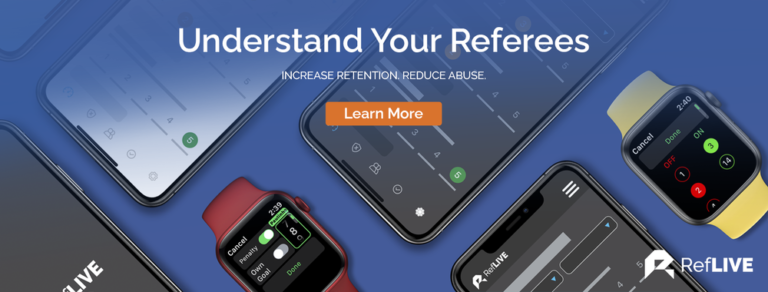Conditions aren’t always perfect on a matchday. Rain, excessive heat, poor pitch condition, partisan fanbases and facilities unfit for purpose are just a few things that can steal your focus prior to heading out into the middle.
It is more than likely that you have refereed a game where an unexpected incident occurred. Did it knock you off your game? Maybe it took you away from concentrating on the next set of decisions you needed to make, or perhaps you were unable to regain your focus and, consequently, your performance suffered for the remainder of the fixture.
The challenge for many officials is that they, too often, prepare for smooth-running events expecting everything to go according to plan. While there may be ideal conditions for refereeing, they come few and far between. Something unexpected will happen in most games, there will always be a bump in the road somewhere during the course of the 90 minutes, if not several bumps. But an unexpected incident does not need to be an unfortunate incident as long as you prepare for the unexpected.
Most officials do not plan for the unexpected, incorrectly assuming that this encourages difficult conditions. There is nothing further from the truth. Top referees mentally prepare for some unexpected events, thus, training their minds to cope with distractions and adapt to circumstances.
How do Olympic Athletes Deal With Unexpected Challenges?
As athletes prepare for the upcoming Tokyo Olympics, they are well aware of the unexpected events that have occurred throughout the history of the Olympics. These elite athletes spend a lot of time getting ready for the out-of-the-blue occurrence and how they will react to those circumstances. Elite athletes understand the need for training their focus so they are mentally prepared to block out distractions.
Sports psychologist Karen Cogan works with Olympic athletes helping them prepare to deal with unexpected circumstances so they are optimally ready when they hit the Olympic stage in Tokyo.
“It’s not so important that we nail the things that are going to happen, but it’s the process about going through the ‘what-ifs,’ and what would you do. That’s something they take with them, and then they’re ready to deal with whatever comes their way.” – Karen Cogan, Sports Psychologist
Additionally, the ability to block out distractions can be improved through training for every athlete at any level.
“You can see how [training your brain to focus] is helpful in competition, when [athletes are] distracted by somebody else, or something going on in the stands, or there’s some delay of some sort. They want to regain their focus so their performance isn’t affected. It’s a learned skill, and something they have to practice in competition and develop as part of their skill set.” – Karen Cogan, Sports Psychologist
The mental skill of focus helps you stay in your “athletic cocoon” where you are fully immersed in what you are doing in the moment. It is this type of focus that produces optimal performance.
How to Manage The Unexpected During a Fixture:
Create some ‘if/then’ scenarios. For example, “If a player makes a serious foul play tackle and I am surrounded before I have time to go through my discipline procedure, then I will pause, take a deep breath, bring the situation under control and then re-focus on the first thing I needed to do.”
After you have some scenarios created, rehearse them in practice. Have a colleague cause a distraction, then perform your re-focusing strategy.
Always keep in mind, peak performance is more than physical training, it requires training your mind.
At The Third Team I work individually and in collaboration with different professionals where I have developed workshops associated with Resilience and Mental Toughness Development to help referees. The workshops are interactive, where referees are encouraged to open up and share their experiences to help each other.
Feel free to contact me if you’d like to know more about my workshops and how I could help you or your officials.
Best Wishes,

Nathan Sherratt
Referee Educator & Managing Director of The Third Team

Nathan Sherratt
Nathan Sherratt, Referee Educator, Resilience Trainer and Managing Director of The Third Team. A Mental Toughness Practitioner based in County Durham, North East England.


